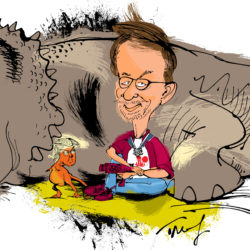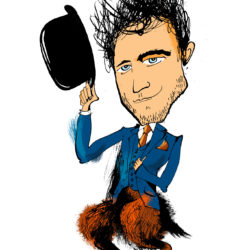How Michelle Williams, an awkward girl from Michigan became Hollywood’s most wanted leading lady
INTERVIEW MICHELE MANELIS ILLUSTRATION TOM MORGAN JONES

Michelle Williams’ fragile beauty conveys the inaccurate impression that she is delicate and docile, when nothing could be farther from the truth. In reality, she exudes a steely confidence which, partnered with obvious intellect and prodigious talent, has seen her nail bold roles galore, including ones too bold for her peers.
Case in point: the ultimate icon, Marilyn Monroe, whose legendary sexual allure is unparalleled. Many big names would have demurred, intimidated by the pressure, but Williams, a waif next to the real Monroe, pulled it off with great aplomb in 2011’s My Week with Marilyn. Expect her to take no prisoners when she makes her next big stretch as whisky-swilling wild woman and rock pioneer, Janis Joplin. Lately she’s been seen as both the daughter-in-law of J. Paul Getty in the true story of his grandson’s 1973 abduction, All the Money in the World, and in The Greatest Show On Earth, showcasing her vocal range and injecting some levity into her mostly gritty cinematic resume.
Williams lives a low-key existence in Brooklyn’s upscale bohemia with her 12-year-old daughter Matilda, the offspring of her relationship with Heath Ledger (whom she met on the set of Brokeback Mountain in 2005). Their well-publicized relationship ended a few months prior to his prescription pill overdose in 2008. She is presently engaged to New York financial consultant Andrew Youmans.
VM: From Dawson’s Creek to the actress who every director in Hollywood wants to work with, you’ve come a long way. How would you describe your trajectory?
MW: I found a picture recently of me around age 15 at a school dance just so awkward and uncomfortable looking. I popped it into my wallet because I’m really proud of having come such a long way. I feel so embracing of where I started; I hold that person so close.
VM: What words do you relate to when people describe you?
MW: Like what would I like written on a tombstone kind of a thing? Just thinking about it makes me feel shy. I don’t know if it’s up to me, and I don’t know how I would describe myself or how I would want myself described. I just want to be good to people. Other than that, I don’t really want much. All I’ve ever wanted is to tell the truth and have the opportunity to do it. That’s what makes me feel happy.
VM: What do you appreciate in other people?
MW: As far as what attracts me to people, that’s probably changed and for the better. If I’m being honest, I think when I was younger I was less of a defined human being and I think I was probably a little bit more persuadable, more easily influenced. Now I probably have a better set of standards to interact with other people.
VM: How do you like to spend your money?
MW: It seems like I’m just spending money on groceries! I don’t know if I am doing it wrong, but man, it’s just groceries and private school.
VM: You seem to have a great relationship with Matilda. What is life like as her mother?
MW: My daughter has taught me everything about love. I’m still learning, but there is no aspect of my life that has gone untouched by being a mother.
VM: Can you talk about the impact the past year has had on you, from the Harvey Weinstein scandal to #MeToo and the Times Up movement?
MW: Change seems to only come out of extreme suffering. And so for me and for so many women that I know it has been incredibly provocative, traumatic and upsetting, because we all have our stories to tell. But what I am left with after the tears have dried is that we are on the verge of something. It’s getting so loud and it’s become such a powerful movement that I actually believe that I am going to hand my daughter a safer world. I believe it and I am going to fight for it and for everyone, because it’s time. So, as upsetting as it’s been, I think I feel more optimistic than ever.
VM: What attracts you to a particular project?
MW: I’m interested in exploring the things that drive people apart and the secrets that make people feel they’re unlovable or not whole — people’s failings, blind spots and inconsistencies. I am interested in the dichotomy of every human being and every story. Every time I get on the subway, I almost get overwhelmed when I think of all the storylines and feelings that exist inside every real human being.
VM: You’re known for performing emotionally grueling scenes as evidenced recently in movies like Manchester by the Sea, and All the Money in the World. How do you unwind after a day of crying on set?
MW: I like to stick my head out of the car window.
VM: Like a dog?
MW: Yes! I like the wind rushing past my face. It feels good. It can be hard to unwind. I like a little bit of space between being on set and being home. The transit time is important, like little portals so that I can come back to the thing that’s most important to me: my family. That includes my five-year-old dog. Lucky is a Spaniely little thing, and very cute. She’s just love, love, love. What can be better than that?


